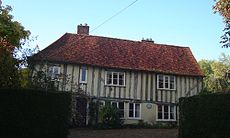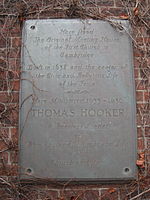- Thomas Hooker
-
For the State Representative, see Thomas Hooker (Michigan politician). For the singer, see Tom Hooker.
Thomas Hooker 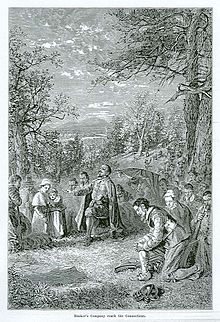
Hooker's Company reach the Connecticut, publishers: Estes & Lauriat, 1879Born July 5, 1586
likely Marefield or Birstall, LeicestershireDied July 7, 1647 (aged 61)
Hartford, Connecticut ColonyNationality  England
EnglandOccupation Congregationalist minister Known for Helped found the Connecticut Colony and write one of the first written constitutions Religion Congregationalist Spouse Susanna (possibly née Garbrand) Hooker (2nd wife)
The name of his first wife is not known[1]Children 6[1] Signature 
Thomas Hooker (July 5, 1586 – July 7, 1647) was a prominent Puritan colonial leader, who founded the Colony of Connecticut after dissenting with Puritan leaders in Massachusetts. He was known as an outstanding speaker and a leader of universal Christian suffrage.
Called today “the Father of Connecticut,” Thomas Hooker was a towering figure in the early development of colonial New England. He was one of the great preachers of his time, an erudite writer on Christian subjects, the first minister of Cambridge, Massachusetts, one of the first settlers and founders of both the city of Hartford and the state of Connecticut, and cited by many as the inspiration for the "Fundamental Orders of Connecticut," cited by some as the world's first written democratic constitution that established a representative government.[2]
Most likely coming out of the county of Leicestershire, in the East Midlands region, the Hooker family was prominent at least as far back as the reign of Henry VIII. There is known to have been a great Hooker family in Devon (colloquially called Devonshire, in the middle of the southwestern peninsula), well-known throughout Southern England. The Devon branch produced the great theologian and clergyman, the Rev. Richard Hooker who, with Sir Walter Raleigh, was one of the two most influential sons of Exeter, the county town of Devon. Family genealogist Edward Hooker linked the Rev. Thomas to the Rev. Richard and the Devon branch. Other Hooker genealogists, however, have traced the Rev. Thomas back to Leicestershire where, in fact, he is said to have been born. Positive evidence linking Thomas to Leicestershire is lacking since the Marefield parish records from before 1610 perished. Any link to the Rev. Richard is likewise lacking since the Rev. Thomas’s personal papers were disposed of and his house destroyed after his death. There remains no evidence giving positive information as to which region Hooker came from, so the issue remains unsettled.[3]
Contents
Life
Thomas Hooker was likely born at Marefield or Birstall, Leicestershire,[4] and went to school at Market Bosworth.[5] He received his Bachelors of Arts from Emmanuel College, Cambridge in 1608, continuing there to earn his Masters of Arts in 1611.[5][6][7] He stayed at Emmanuel as a fellow for a few years.[5] After his stay at Emmanuel, Hooker preached at the Esher parish, where he earned a reputation as an excellent speaker.[5][7]
Around 1626, Hooker became a lecturer at the Chelmsford Cathedral.[5] However, in 1629 Archbishop William Laud suppressed church lecturers, and Hooker was forced to retire to Little Baddow.[5] His leadership of Puritan sympathizers brought him a summons to the Court of High Commission. Forfeiting his bond, Hooker fled to Rotterdam, Holland,[7] and from there immigrated to Massachusetts Bay Colony aboard the Griffin.[1][5]
Hooker arrived in Boston and settled in Newtown (later renamed Cambridge), where he became the pastor of the First Parish Church. His parish became known as "Mr. Hooker's Company".[5]
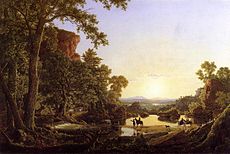 Hooker and Company Journeying through the Wilderness from Plymouth to Hartford, in 1636, Frederic Edwin Church, 1846
Hooker and Company Journeying through the Wilderness from Plymouth to Hartford, in 1636, Frederic Edwin Church, 1846
Voting in Massachusetts was limited to freemen, individuals who had been formally admitted to their church after a detailed interrogation of their religious views and experiences. Hooker disagreed with this limitation of suffrage, putting him at odds with the influential pastor John Cotton. Owing to his conflict with Cotton and discontented with the suppression of Puritan suffrage and at odds with the colony leadership,[7] Hooker and the Rev. Samuel Stone led a group of about 100[8] who, in 1636, founded the settlement of Hartford, named for Stone’s place of birth: Hertford, in England.[9]
This led to the founding of the Connecticut Colony.[5][10] Hooker became more active in politics in Connecticut. The General Court representing Wethersfield, Windsor and Hartford met at the end of May 1638 to frame a written constitution in order to establish a government for the commonwealth. Hooker preached the opening sermon at First Church of Hartford on May 31, declaring that "the foundation of authority is laid in the free consent of the people."[11]
On January 14, 1639, freemen from these three settlements ratified the "Fundamental Orders of Connecticut" in what John Fiske called "the first written constitution known to history that created a government. It marked the beginnings of American democracy, of which Thomas Hooker deserves more than any other man to be called the father. The government of the United States today is in lineal descent more nearly related to that of Connecticut than to that of any of the other thirteen colonies."[12]
In recognition of this, on the wall of the narrow alleyway just outside the grounds near the Chelmsford Cathedral in Chelmsford, Essex, England, where he was town lecturer and curate, there is a Hooker Memorial Civic Plaque fixed high on the wall of the narrow alleyway, opposite the south porch, that reads: "Thomas Hooker, 1586 - 1647, Curate at St. Mary’s Church and Chelmsford Town Lecturer 1626-29. Founder of the State of Connecticut, Father of American Democracy."[13]
The Rev. Hooker died during an "epidemical sickness" in 1647, at the age of 61. The location of his grave is unknown, although he is believed to be buried in Hartford's Ancient Burying Ground. Because there was no known portrait of him, the statue of him that stands nearby, in front of Hartford’s Old State House, was sculpted from the likenesses of his descendants. However, the city is not without a sense of humor regarding its origins. Each year, organizations and citizens of Hartford dress up in outrageous costumes to celebrate Hooker Day with the Hooker Day Parade. T-shirts sold in the Old State House proclaim "Hartford was founded by a Hooker."[14]
Views
Thomas Hooker strongly advocated extended suffrage to include Puritan worshipers, a view which would lead him and his followers to colonize Connecticut.[5] He also promoted the concept of a government that must answer to the people, stating: "[T]hey who have the power to appoint officers and magistrates, it is in their power, also, to set the bounds and limitations of the power and place unto which they call them" through "the privilege of election, which belongs to the people according to the blessed will and law of God".[5] Thomas Hooker argued for greater religious tolerance towards all Christian denominations.[15]
Hooker defended the calling of synods by magistrates, and attended a convention of ministers in Boston whose purpose was to defend Congregationalism.[5] He later published A Survey of the Summed of Church-Discipline in defense of Congregationalism, and applied its principles to politics and government.[7]
Thomas Hooker was a strong leader of the contrition doctrine. He believed that much of God's favor needed to be re-earned by men.[16] To Hooker, sin was the most crafty of enemies, defeating grace on most occasions. He disagreed with many of the predecessor theologies of Free Grace theology, preferring a more muted view on the subject. He focused on preparation for heaven and following the moralist character.[16]
Family
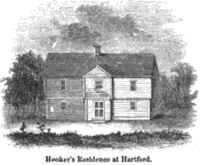 House of Thomas Hooker, Hartford, Connecticut
House of Thomas Hooker, Hartford, Connecticut
Thomas Hooker came to the colonies with his second wife, Suzanne. Nothing is known of his first wife.
His son Samuel, likely born at Cambridge, Massachusetts, graduated from Harvard College in 1653. He became the well-known minister of Farmington, Connecticut, where his descendants lived for many generations.[notes 1] Of Rev. Samuel Hooker, Cotton Mather wrote in Magnalia Christi Americana: "Thus we have to this day among us our dead Hooker, yet living in his worthy son Samuel Hooker, an able, faithful, useful minister at Farmington, in the Colony of Connecticut."
John Hooker, son of Rev. Samuel and grandson of Rev. Thomas, served as Speaker of the Connecticut Assembly, and previously as Judge of the state supreme court. James Hooker, brother of John and son of Rev. Samuel, also became a prominent political figure in Connecticut. He married the daughter of William Leete of Guilford, Connecticut, and subsequently settled there. James Hooker served as the first probate judge, and later as speaker of the Connecticut colonial assembly. Rev. Thomas's granddaughter Mary Hooker, the daughter of Rev. Samuel, married the Rev. James Pierpont. Their daughter Sarah Pierpont married the Rev. Jonathan Edwards.
Other direct descendants of Rev. Thomas Hooker include Henry Hooker, Mary Hooker Pierpont, William Howard Taft, Timothy Dwight V, Aaron Burr, William Gillette, William Huntington Russell, Edward H. Gillette, George Catlin, Emma Willard, J.P. Morgan, Rev. Joshua Leavitt, Roger Hooker Leavitt, Hart Leavitt, Thom Miller, and Adonijah Rockwell.[1] On May 16, 1890, descendants of Thomas Hooker held their first reunion at Hartford, Connecticut.[17]
Works
- The Application of Redemption (1659). Ames, Iowa (USA): International Outreach. 2008. p. 450. ISBN 7981892838155. http://www.heritagebooks.org/bookstore/catalog/product_info.php?products_id=8718.
- A Brief Exposition of the Lord's Prayer (1645). Whitefish, MT (USA): Kessinger Publishing. p. 92. ISBN 1436719224. http://www.kessinger.net/searchresults-orderthebook.php?ISBN=1436719224.
- The Christian's Two Chief Lessons: Self-Denial and Self-Trial. Ames, Iowa (USA): International Outreach. 2002. p. 174. ISBN 0964180375. http://www.heritagebooks.org/bookstore/catalog/product_info.php?products_id=3729.
- The Covenant of Grace Opened. Whitefish, MT (USA): Kessinger Publishing. p. 90. ISBN 0766168115. http://www.kessinger.net/searchresults-orderthebook.php?ISBN=0766168115.
- The Danger of Desertion Or A Farewell Sermon of Mr. Thomas Hooker. Whitefish, MT (USA): Kessinger Publishing. p. 36. ISBN 0766171957. http://www.kessinger.net/searchresults-orderthebook.php?ISBN=0766171957.
- An Expostion of the Principles of Religion (1645).
- The Poor Doubting Christian Drawn to Christ (1629). Whitefish, MT (USA): Kessinger Publishing. p. 24. ISBN 0766168980. http://www.kessinger.net/searchresults-orderthebook.php?ISBN=0766168980.
- The Saint's Dignity and Duty (1651). Whitefish, MT (USA): Kessinger Publishing. p. 262. ISBN 0766169464. http://www.kessinger.net/searchresults-orderthebook.php?ISBN=0766169464.
- The Soul's Exaltation (1638). Whitefish, MT (USA): Kessinger Publishing. p. 314. ISBN 0766167992. http://www.kessinger.net/searchresults-orderthebook.php?ISBN=0766167992.
- The Soul's Humiliation. Ames, Iowa (USA): International Outreach. 2000. p. 167. ISBN 1892838052. http://www.heritagebooks.org/products/The-Soul%27s-Humiliation.html.
- The Soul's Ingrafting into Christ (1637).
- The Soul's Preparation for Christ: Or, A Treatise of Contrition, Wherein is discovered How God breaks the heart, and wounds the Soul, in the conversion of a Sinner to Himself The Soul's Preparation for Christ (1632). Ames, Iowa (USA): International Outreach. 1994.
- A Survey Of The Summe Of Church-Discipline: Wherein The Way Of The Churches Of New England Is Warranted Out Of The Word (1648). Whitefish, MT (USA): Kessinger Publishing, LLC. p. 646. ISBN 0766169251.
Notes
- ^ Married to the eldest daughter of Capt. Thomas Willett of Plymouth Colony, a Plymouth merchant and later first mayor of New York City, Rev. Samuel Hooker was the progenitor of all Hookers who claim descent from Rev. Thomas Hooker of Connecticut. [1]
References
- ^ a b c d Hooker, Edward; Margaret Huntington Hooker (1909). The Descendants of Rev. Thomas Hooker, Hartford, Connecticut, 1586-1908. Harvard University. http://books.google.com/?id=r17mNhtcPRwC&pg=PA231&lpg=PA231&dq=%22henry+hooker%22+house+.
- ^ Following the Rev. Hooker’s sermon in which he declared, “The foundation of authority is laid in the free consent of the people,” the Fundamental Orders were adopted by the colony of Connecticut on January 14, 1639 (by New Style reckoning). While some modern historians dispute the claim that this was the first constitution in the western democratic tradition, neither the Mayflower Compact nor the Narragansett communities agreements established any forms of government. Furthermore, former Connecticut Chief Justice Simeon E. Baldwin upheld the claim in Norris Osborn’s History of Connecticut in Monographic Form, declaring that “never had a company of men deliberately met to frame a social compact for immediate use, constituting a new and independent commonwealth, with definite officers, executive and legislative, and prescribed rules and modes of government, until the first planters of Connecticut came together for their great work on January 14th, 1638-9.” Drafted primarily by Roger Ludlow, it was clearly the first compact between a government and the people to uphold the Rev. Hooker’s proclamation that the foundation of constitutional authority was with the people. Ref: Osborn, Norris Galpin, Editor, History of Connecticut in Monographic Form (States History Co., 1925); Hooker, John, An Account of the Reunion of the Descendants of Rev. Thomas Hooker (The Salem Press, 1890), p. 27; Logan, Walter Seth, Thomas Hooker, the First American Democrat (The Order of the Founders and Patriots of America, 1904), p. 19; Lutz, Donald S., Stephen L. Schechter & Richard B. Bernstein, Roots of the Republic: American Founding Documents Interpeted, p. 24; CT.gov, The Official State of Connecticut Website <ww.ct.gov/ctportal/cwp/view.asp?a=246434>; Connecticut, History of the USA www.usahistory.info/New-England/Connecticut.html.
- ^ Hooker, Edward, “The Origin and Ancestry of Rev. Thomas Hooker,@ a paper prepared by Commander Edward Hooker, U.S.N., and read before the Hooker gathering, August, 1892, The New England Historical and Genealogical Register, by New England Historic Genealogical Society Staff (Heritage Books, 1997), pp. 189–192; The New England Historical and Genealogical Register, Vol. 44, by New England Historic Genealogical Society Staff (N.E. Historic Genealogical Society, 1890), pp. 397–398; Hooker, Margaret Huntington, “Introduction,” Hooker, Edward W., The Descendants of Rev. Thomas Hooker: Hartford, Connecticut, 1586–1908, p. ix; Porter, Alice, “Thomas Hooker,” Connecticut Magazine, July–August 1906 <www.history.rays-place.com/ct/thomas-hooker.htm>; Underwood, Nancy, Ancestry and Descendants of Rev. Thomas Hooker <www.geocitiescom/Heartland/Pointe/8663/thomashooker.html>
- ^ Thomas Hooker. ABC-CLIO. 2006. ISBN 9781576076781. http://books.google.com/?id=EzvHvEDPosQC&pg=PA130&lpg=PA130&dq=marefield+leicestershire+hooker&q. Retrieved 19 April 2010.
- ^ a b c d e f g h i j k l "THOMAS HOOKER (1586–1647)". Encyclopædia Britannica. 1911.
- ^ Hooker, Thomas in Venn, J. & J. A., Alumni Cantabrigienses, Cambridge University Press, 10 vols, 1922–1958.
- ^ a b c d e "Hooker, Thomas (1586-1647)". Encyclopedia of World Biography. 1998.
- ^ Lucas, Beverly Johnson (August 2002). "History in houses: the Butler-McCook house and garden in Hartford, Connecticut.". The Magazine Antiques: pp. 88–96
- ^ Walker, George Leon, Thomas Hooker: Preacher, Founder, Democrat (Dodd, Mead and Company, 1891), p. 97; Allen, Morse S., & Arthur H. Hughes, Connecticut Place Names (The Connecticut Historical Society, 1976), p. 234; Gross, Governor Wilbur L., Sponsor, Connecticut, American Guide Series by Workers of the Federal Writers’ Project of the Works Progress Administration for the State of Connecticut (The Riverside Press, 1938), p. 169.
- ^ Kennedy, David; Lizabeth Cohen; and Thomas A. Bailey (2006). The American Pageant 13th ed. Boston: Houghton Mifflin. p. 49. ISBN 0-618-4790-6.
- ^ Hooker, Thomas, Lecture delivered at the First Church, Hartford, Connecticut, on May 31, 1638, quoted in Walker, George Leon, Thomas Hooker: Preacher, Founder, Democrat, p. 125; and Trumbull, Benjamin, A Complete History of Connecticut, Vol. I (Maltby, Goldsmith and Co., and Samuel Wadsworth, 1818, and Arno Press, 1972), pp. 20–21.
- ^ Fiske, John, Beginnings of New England, or the Puritan Theocracy in Its Relation to Civil and Religious Liberty (Houghton Mifflin Company, the Riverside Press, Cambridge, 1889), pp. 127–28.
- ^ The Cathedral Church of St Mary, St Peter, and St Cedd, Chelmsford, England, a center of worship and mission; Brief History <http://www.chelmsfordcathedral.org.uk/blue1/history.htm; Thomas Hooker <www.britannia.com/bios/hooker.html
- ^ Hartford Courant, "Peters Is the Mayor to Lift City's Spirits", September 7, 1993, p. B.1; Hartford.com www.hartford.com/event-detail.php?id=341
- ^ Goode, Stephen (5 May 1997). "Why religious persecution violates American values". Insight on the News: pp. 14–15
- ^ a b Parnham, David (December 2008). "Redeeming free grace: Thomas Hooker and the contested language of salvation". Church History: Studies in Christianity and Culture (New Haven, Connecticut: American Society of Church History) 77 (4): 915–955.
- ^ "In Honor of Thomas Hooker, His Descendants to Hold a Reunion in Hartford, Conn.", The New York Times, May 1, 1890
External links
- Who was Thomas Hooker? at Thomas Hooker School History
Categories:- 1586 births
- 1647 deaths
- Puritans
- American pioneers
- Founders of Hartford, Connecticut
- New England Puritanism
- Pre-state history of Connecticut
- People from Harborough (district)
- Fellows of Emmanuel College, Cambridge
- Massachusetts colonial people
- People from Hartford, Connecticut
- History of religion in the United States
- Connecticut colonial people
- American people of English descent
- American clergy
- Alumni of Emmanuel College, Cambridge
Wikimedia Foundation. 2010.

